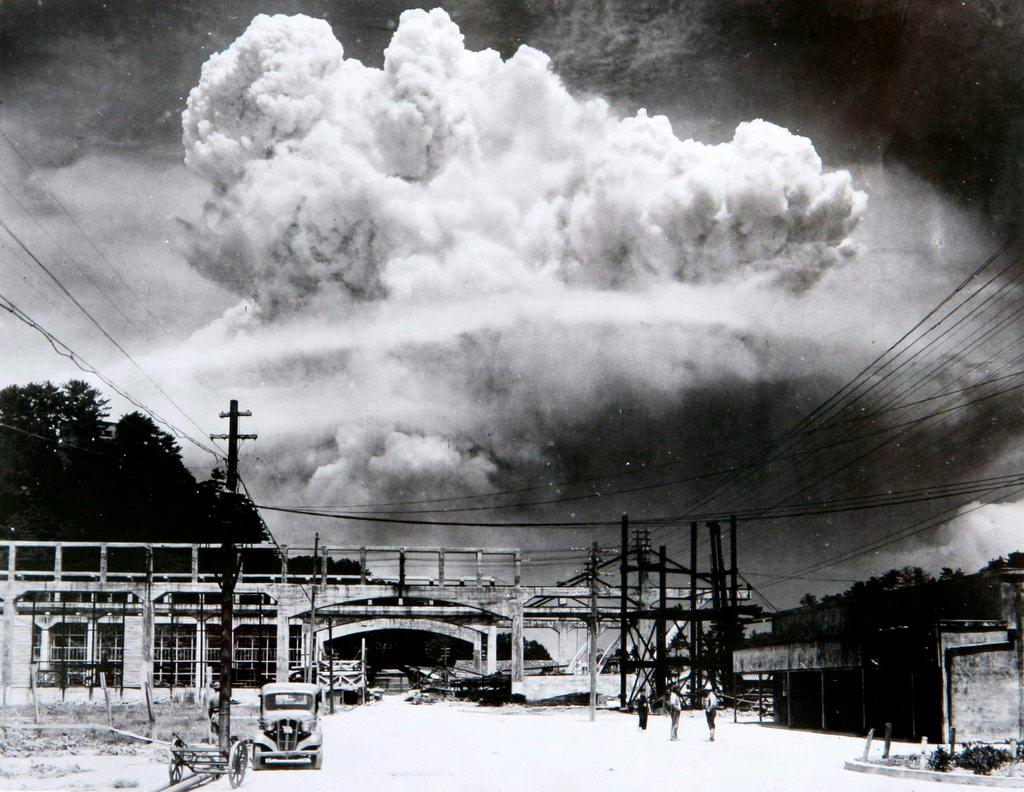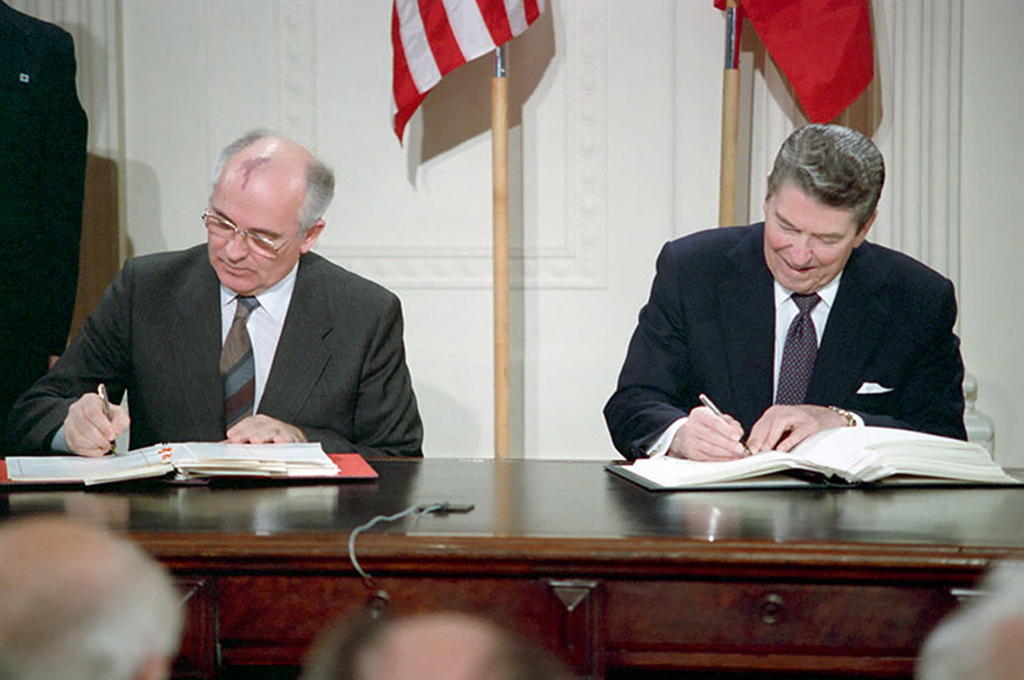
Can the city of peace stop the arms race?

Last week on the train to Geneva, I heard the tell-tale wail of sirens. That time of year again: to dust off the bunkers that every upstanding Swiss household has, test those blast-proof doors, and make sure those sirens can still howl in unison.
For so many years, Swiss civil defence was treated by many of us as a bit of a joke; I remember doing a very tongue-in-cheek report which included a scene in which my neighbour and I drank coffee in her bunker, surrounded by skis and bottles of wine.
No one, the jokey message suggested, ever expected those bunkers to be used for their original purpose…but they were awfully useful as wine cellars, ski depots, or at a pinch, ‘I want to be alone’ spaces for truculent teenagers.
But, just a couple of days after that annual siren test, an information sheet from the ICRC fluttered into my inbox, asking: ‘Is the world ready to face a nuclear war?’External link
The word ‘NO’ springs to mind faster than the speed of, well, one of those inter-ballistic missiles that can apparently reach their well-populated targets in a few short minutes.

More
Switzerland regrets the suspension of INF nuclear treaty
Rising tide of nuclear risks
The answer from the ICRC is a resounding ‘NO’ too. For some years now, the organisation has been urging member states to back the Treaty on the Prohibition of Nuclear Weapons. ICRC President Peter Maurer views the treaty as ‘a beacon of hope and an essential measure to reduce the risk of a nuclear catastrophe’.
The most ‘devastating and destructive weapons ever invented’ the ICRC believes, can almost certainly never be used in accordance with international humanitarian law. How can a weapon designed to eradicate entire cities ever honour the principles of proportion or distinction?
Unfortunately, governments have not been rushing to sign up to the treaty; none of the nuclear powers have touched it, and in Europe just three states have ratified it: Austria, the Holy See, and San Marino.
Instead, all the signs are there, says Marc Finaud of the Geneva Centre for Security PolicyExternal link, that the world is headed for another arms race.
“We are in this race,” says Finaud, an arms proliferation expert and former French diplomat, “and it is very hard to find any nuclear country that is not engaged in this race.”
Tit-for-tat arms race
This month’s announcement by Washington that the US would withdraw from the Intermediate Range Nuclear Forces Treaty (INF) is, he says, not the first but just the latest sign that arms control has slipped dangerously low on the global agenda.
“It started after the [US] withdrawal (2002) from the Anti-Ballistic Missile Treaty (ABM),” explains Finaud. “That is when Russia realised that if the US is deploying ABM systems then the whole Russian system of defence based on second strike would be endangered, so the only solution is to find more offensive systems.”
The new arms race started, Finaud believes, when Russia began to compensate for the lack of the ABM treaty by upgrading its missile systems. And, of course, the US viewed that compensation as a violation of the INF, warned Russia, and then announced it would withdraw from that treaty too.
As sure as night follows day, Moscow reacted. If the US was abandoning the INF treaty, then Russia would too. And, its government said, it might even develop a new range of missiles, the implication being that these would fly faster, and more stealthily, than their predecessors.
European battleground
“When you have the kind of missiles that were banned by the INF,” explains Finaud, “you create basically a battlefield, in this case Europe.”
These are not comforting thoughts, even though NATO Secretary General Jens Stoltenberg said he personally was not losing any sleep over the collapse of the INF treaty – or not yet, he added.
But groups like the Geneva Centre for Security Policy, and humanitarian organisations like the ICRC, are worried that the hard won treaties to control the world’s most lethal weapons are being eroded.
With the ABM gone, and now the INF too, unless Washington and Moscow can agree to revive it, the next big test will be whether the one remaining treaty, known as New START, will survive. It regulates the ‘strategic’ or intercontinental ballistic missiles with which the US and Russia can destroy each other. New START expires in just two years, and there are, so far, no moves to negotiate a renewal.
“Of course, we would like to salvage something,” says Marc Finaud. “We all hope reason will prevail. It’s in nobody’s interest to remove restrictions on any nuclear state.”
Not least, arms controls experts point out, because some of the world’s nuclear powers have yet to sign up to any treaties. China, for example, which is known to have a substantial arsenal of intermediate range nuclear weapons, has not signed the INF.
Can Geneva help?
So, can disarmament bodies in Geneva help? The Conference on Disarmament (CD)External link is in session this week in Geneva; numerous member states have already expressed concern about the INF pull out. But while the CD provides a forum for discussion it is not, Marc Finaud says, “a place to negotiate an agreement… it is more of a sounding board, for appeals, pleas, or arguments”.
Anja Kaspersen, the Deputy Secretary General of the CD, admits the body has not been especially effective recently.
“It is true the negotiations have been elusive for the last two decades,” she concedes. “But the mechanism works.”
As examples Kaspersen cites the Nuclear Proliferation Treaty and the Biological Weapons Convention, both negotiated within the CD, and both, she believes “important components of the global disarmament framework”.
“Geneva is a good environment, we have a lot of expertise,” adds Marc Finaud. “So, it would be a good place to negotiate, but it would need a political will I don’t see at the moment.”
Most arms controls experts predict that if there is a move back towards negotiation, it will begin bilaterally, between Russia and the US, and not within a multilateral framework like the CD.
Nevertheless, in today’s climate, with multiple nuclear actors, disarmament negotiations can’t be effective if they stay bilateral.
“The novel, interlinked and interconnected challenges of today cannot be fully met by… divisive and fragmented approaches,” says Kaspersen. “We need multilateralism, we need bodies like the Conference – for which no discernible alternative today exists.”
So, as those sirens still echo in my ears, I am, somewhat, comforted to know that there are diplomats, experts, and humanitarians still working to keep us away from the nuclear brink, even if our elected politicians are pushing us towards it.
Those politicians might be best advised to spare a few minutes (the time it might take from launch to mushroom cloud for example) to watch this video from the ICRC External linkon the real consequences of a nuclear war.
And in the meantime, I personally want to keep all those bunkers – but only for skis and wine.

In compliance with the JTI standards
More: SWI swissinfo.ch certified by the Journalism Trust Initiative





























You can find an overview of ongoing debates with our journalists here . Please join us!
If you want to start a conversation about a topic raised in this article or want to report factual errors, email us at english@swissinfo.ch.